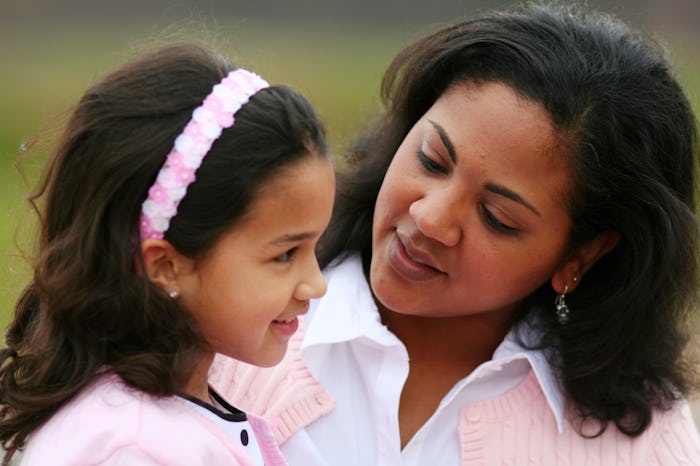Life

Basic Rules For Talking To My Kid About Politics
In a past life, I worked in politics, leaving college for a semester to travel around the country planning motorcades for Senator Kerry when he ran for president, serving as a gubernatorial tracker, and running an unsuccessful Congressional race for an Iraq war vet. Never once did it occur to me that talking about politics with kids might be inappropriate. However, in the last decade, politics has changed. Heck, in the last year it's has taken a turn, and it's time to brush up on the basic rules for talking to my kid or any kid about politics.
I grew up talking politics around the dinner table, although it was always understood that it wasn't appropriate to rant or rave about it in mixed company. However, with this latest election cycle, it's now barely appropriate to talk about some of the basic facts in public. With Trump caught on tape talking about "grabbing her by the p*ssy" or being accused by a foreign government of compromising public and private behavior, it's hard to know what is safe for a child's ears.
But just because the current president doesn't have an understanding of what is appropriate to say, doesn't mean manners and politeness and decorum go out the window. Furthermore, it doesn't mean politics should be an outlawed topic of conversation. Kids do need to know that grown-ups can speak thoughtfully and with passion and compassion about politics, despite what headline news might lead you to believe. One bottom line? Keep Michelle Obama's mantra in mind: "When they go low, we go high." Everything you speak to my kid about politics should pass that litmus test first.
Maybe Don't
First things first: consider whether it's appropriate at all to speak to someone else's kid about politics. If you're talking about how awesome it is to go vote or how you love volunteering for your political party, yes, this can be inspiring to a child. But if you're bending their ear about abortion rights, it might be better left unsaid.
Ask First
Definitely ask me first before you talk to my child about politics. I think it's important for my kid to be able to talk constructively about what's going on in the world, but within certain age-based parameters. Children from marginalized groups, however — like minorities or LGBTQ families — might find politics currently produces too much anxiety. Ask the parent first before talking with a kid about politics.
Skip The Gruesome Details
This election in particular, there are details that are mind-bogglingly inappropriate to talk about with kids.If you're going to talk to my kid or any kid that isn't yours, skip the gruesome details and pick a subject that's more family-friendly.
Leave Out The Hatred
While politics at the moment is full of hatred, please leave that out of the conversation when you're talking with my kid about it. I sometimes have a hard time doing this when I'm talking to adults, but re-hashing the stories of hatred between humans rarely does anything other than stir panic.
Avoid Spreading Fear
I know that when I talk about politics at the moment, I sound fearful. That's because, most of the time, I'm terrified. So it's easier said than done not to spread fear, but it's imperative that you not spread fear to my kid. Heck, she can't even vote yet! Instead, talk to her about ways kids can help other people as much as possible and even though they're young and don't yet have the right to vote.
Don't Bash Voters
If you're going to criticize, criticize candidates' policies. Try to stay away from bashing voters for their choices, as hard as that may be. I want my kid to know that she won't be punished for making a choice you don't agree with.
Ask What They Think/Know/Feel/Fear
Talking to kids about politics is a little like talking to adults: it's not just about you and your opinions. It's also about learning what they think, know, feel, or fear. So, it's important that they feel heard, and that what they have to say is important. Talking to kids about what they understand about politics is also just generally interesting, and should be more interesting to you than spreading whatever ideology you have to my kid.
Be Reassuring
This is a hard one for many of us at the moment. I have a pretty hard time reassuring myself that it's all going to be fine, especially when my Facebook feed literally never stops directing me to article after article insisting it is not all fine. But when talking to my kid, take a page out of Mr. Roger's book and "look for the helpers." Talk to them about the kindness that is coming from this campaign, rather than dwelling on the hatred and fear. Talk about the Muslim community that raised money to fix Jewish cemeteries that were vandalized. Talk about the Muslim American who takes care of very sick children.
Vote
If you have the right to vote, and you want to talk about politics, you'd better be using that right. This election, with the popular vote/electoral college disparity, makes the age-old saying that your vote counts a little harder to stand behind, but that's all the more reason to keep doing it. (And maybe find a way to fight partisan redistricting as well!)
Introduce Ways To Get Involved
Getting involved in politics, for our family, doesn't just mean voting. It means volunteering for political candidates we believe in, marching for causes we believe in, and joining organizations who are fighting for what we believe in. If you're particularly involved in a cause, talk to my kid about the importance of spending your time on that rather than worrying or wallowing. I want my kid to have as many examples as possible of people who are working (not just talking) to help make this country safer and kinder.